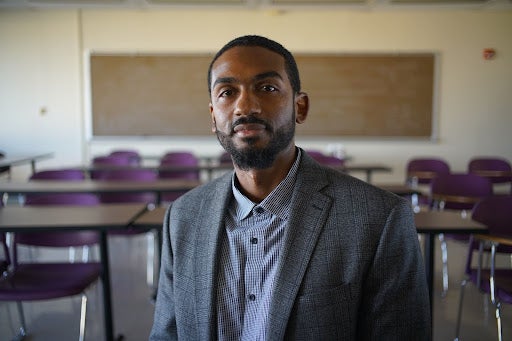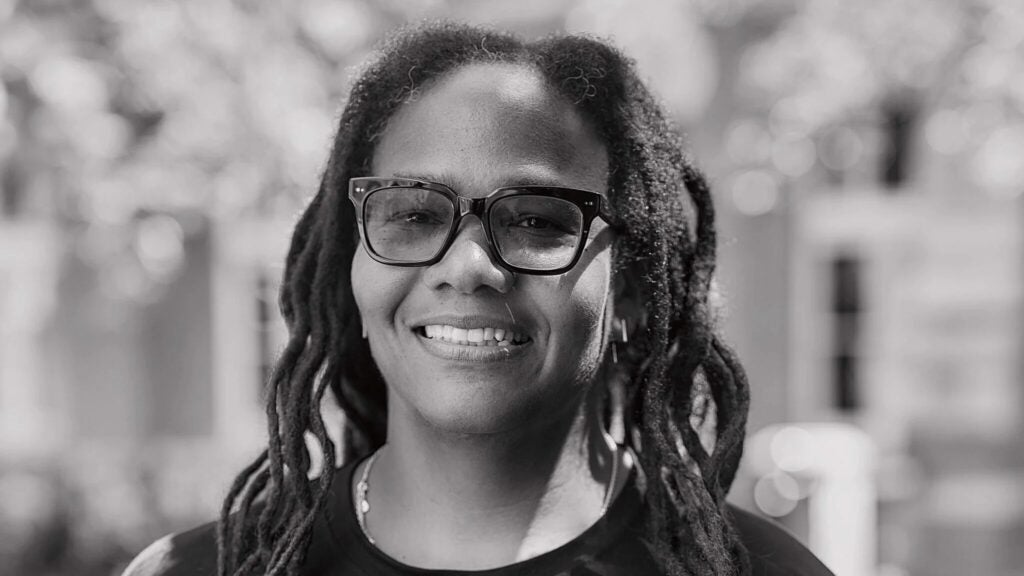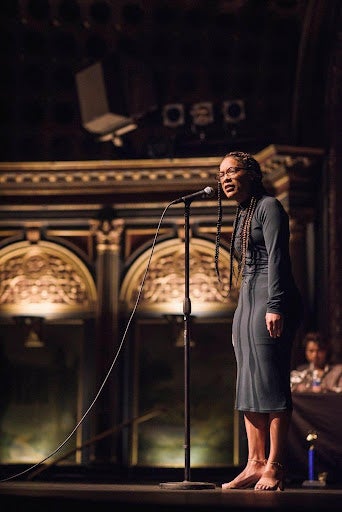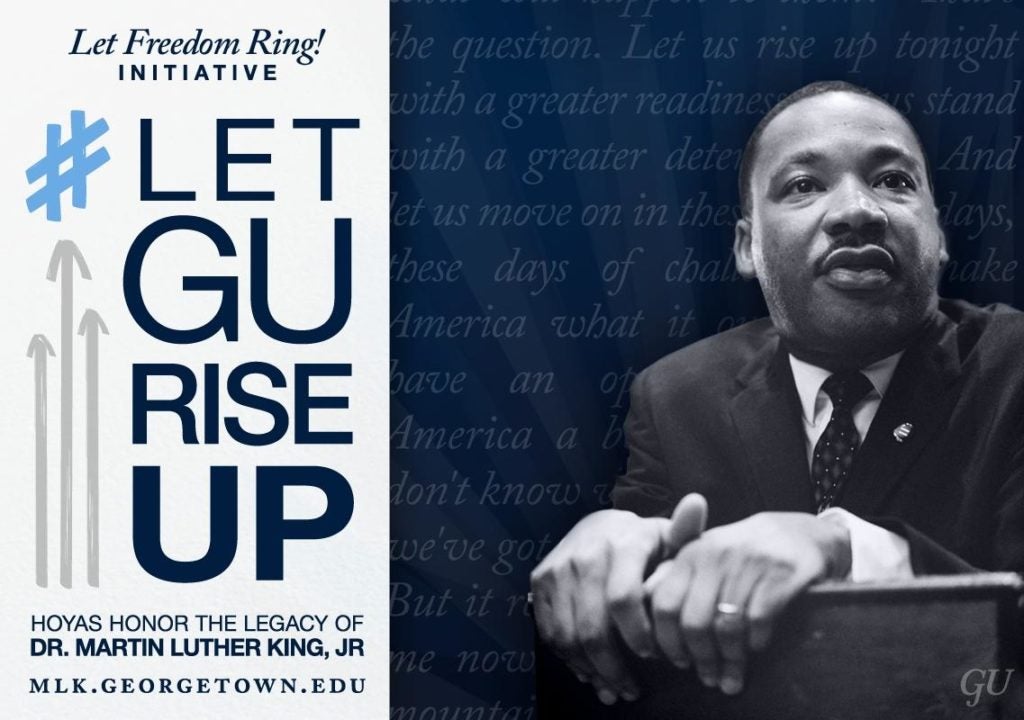Teach Dr. King’s Speech
Each year, as part of Georgetown University’s MLK: “Let Freedom Ring!” Initiative, the Center for Social Justice encourages members of our community to reflect on one of Dr. King’s famous speeches via Teach the Speech. Over the years, faculty, staff, and students across campus have participated in the Teach the Speech events focusing on a wide range of speeches by Dr. King.
In 2024, the Georgetown community is invited to commemorate the 60th anniversary of the 16th Street Baptist Church Bombing as we focus on Dr. King’s “Eulogy for the Four Little Girls.”
In addition, all are invited to join our annual Teach-In (either in person or on Youtube Livestream) on Friday, January 26, 2024 from 10:30am-3:15pm in Copley Formal Lounge on Georgetown’s Hilltop campus. The priority deadline to RSVP for the event is January 20, 2024. This deadline will allow us to coordinate spaces and food. Please email any questions, comments, or concerns that you have for Teach the Speech planning committee to Lionell Daggs III, Associate Director, Racial Justice Initiatives at the Center for Social Justice, at racialjustice@georgetown.edu.
This year’s event features a lecture by Dr. Orisanmi Burton and a selection of poems offered by artist Asia Bryant-Wilkerson. Parts of the event will be offered in-person and through Youtube livestream.
- 10:30am-12:00pm: Anti-racism Examen (guided community reflection and dialogue space on anti-racism) (in-person only)
- 12:00-12:45pm: Community gathering with Lunch (in-person only)
- 12:45-1:45pm: Dr. Orisanmi Burton lecture with Q & A facilitated by Dr. Dayo Gore (in-person and livestream)
- 1:45-2:15pm: Book signing of “Tip of the Spear: Black Radicalism, Prison Repression, and the Long Attica Revolt” with Dr. Orisanmi Burton (in-person only)
- 2:15-2:30pm: Break (coffee, tea, and dessert) (in-person only)
- 2:30-3:15pm: Selection of poetry by Asia Bryant-Wilkerson and closing (in-person and livestream)

Dr. Orisanmi Burton is an assistant professor of anthropology at American University. His research employs ethnographic and archival methods to examine historical collisions between Black radical organizations and state repression in the United States. Dr. Burton’s work has been published in North American Dialogue, The Black Scholar, American Anthropologist, and Radical History Review among other outlets and has received support from the Wenner-Gren Foundation, the Radcliffe Institute for Advanced Study at Harvard University, and The Margarite Casey Foundation, which selected him as a 2021 Freedom Scholar. Dr. Burton’s first book, entitled Tip of the Spear: Black Radicalism, Prison Repression, and the Long Attica Revolt was published by the University of California Press on October 31, 2023.

Dr. Dayo F. Gore is an associate professor of African American Studies at Georgetown University. Dr. Gore will facilitate the Q&A with Dr. Burton. Her research interests include black women’s intellectual history; 20th-century U.S. political and cultural activism; African American and African Diasporic politics, and gender and sexuality studies. She earned a Ph.D. in History from New York University and has previously taught at the University of Massachusetts-Amherst. Dr. Gore is the author of Radicalism at the Crossroads: African American Women Activists in the Cold War which charts the political commitments and strategic leadership of a network of black women radicals operating within the U.S. left from the 1930s through the 1960s. She is also the editor (with Jeanne Theoharis and Komozi Woodard) of “Want to Start A Revolution?” Radical Women in the Black Freedom Struggle; co-editor with Sarah Haley and Prudence Cumberbatch of a special issue of Souls: A Critical Journal of Black Politics, Culture and Society, titled “Black Women Labor: Economics, Culture and Politics” (January–March 2016) and most recently contributed an article to the collection We Could Turn this Whole World Over: Black Women’s Internationalism in the Twentieth Century from University of Illinois Press (2018).

Asia Bryant-Wilkerson is a writer, installation artist, and arts organizer from Los Angeles, CA. In 2016, she received her B.A. in Communication Studies from the University of San Francisco, and in 2020 she earned her MFA in Performance & Performance Studies from Pratt Institute in Brooklyn, NY. Much of her poetry focuses on the process and power of grieving. She has toured the United States performing and facilitating writing workshops at various colleges and universities. She was the 2018-2019 Watering Hole Fellow and is currently the Artist in Residence at Black in Mayberry.
- 2013: Letter from a Birmingham Jail
- 2014: 1963 March on Washington for Jobs and Freedom
- 2015: The Other America
- 2016: Dr. King’s Nobel Peace Prize Acceptance Speech
- 2017: Beyond Vietnam: A Time to Break the Silence
- 2018: I’ve Been to the Mountaintop
- 2019: Remaining Awake Through a Great Revolution
- 2020: Where Do We Go From Here?
- 2021: Our God is Marching On
- 2022: I Have a Dream
- 2023: The Drum Major Instinct
- 2024: Eulogy for the Four Little Girls
